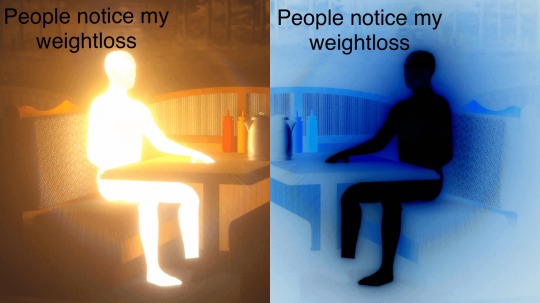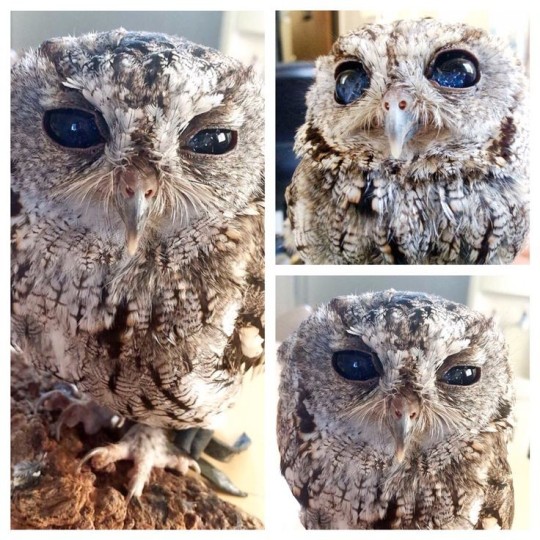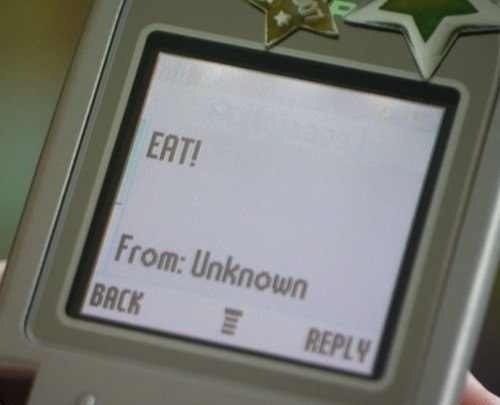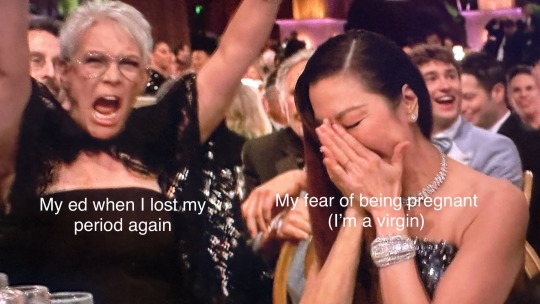#tw osfed
Text
Somewhat Quick Guidelines for How Not to be Triggering to ED-Havers
i'll do a more elaborate version of this some other time, but i have just consumed way too much youtube and i need to get some very mixed feelings out of my system
(tw for some discussion of EDs and the areas these render most sensitive)
Don't equate 'eating disorder' with 'anorexia nervosa'
The most common eating disorders are Binge-Eating Disorder and OSFED – according to Santomauro et al. (2021) and Yasmina and Keski-Rahkonen (2022), OSFED is more common than BED, so yeah. OSFED includes many, many categories in and of itself, including: subthreshold bulimia, subthreshold BED, atypical anorexia, purging disorder, and night eating syndrome. Orthorexia isn't recognised in the DSM-5-TR, but should be. I could not tell you what the most common form of OSFED is – I'd always thought it was atypical anorexia, but some studies I can find on a general population point more to purging disorder, subthreshold BN, subthreshold BED, (see Stice, Marti, & Rohde (2013), while this more recent study in a less reputable journal by Hay et al. (2023) places atypical AN as the most common OSFED. Either way, full-threshold AN is comparatively very, very rare.
Most eating disorders are not becoming emaciated + growing lanugo. If you did become emaciated and grow lanugo, then I'm proud of you for surviving your ED every day, because they are the absolute worst illnesses. However, you are also in a substantial minority. That doesn't make you any less valid—all it means is that EDs aren't necessarily traditional anorexia.
I'll get onto the main difference between atypical and non-atypical AN in a minute, but for now, let's say that even if atypical AN is horrifyingly common, most EDs aren't anorexia of any kind. Most EDs are one of the other kinds. And while good AN rep is great and rare, using 'eating disorder' to mean 'anorexia' is incredibly dismissive of the immense and debilitating of eating disordered behaviour out there. It's limited in the same way as using 'neurodivergent' to just mean 'autism + ADHD' – just as neurodivergence is much, much broader than Au/DHD (and this isn't to detract from the validity of Au/DHD folks), EDs are much, much broader than anorexia, and using 'eating disorder' as a synonym for 'thin and restrictive' is an extremely limited definition.
Moreover, many ED-havers go to immense, immense efforts to downplay their symptoms. The common refrain you'll hear in ED recovery is 'but I'm not sick enough to need help' – and the more narrow the operational definition of ED, the more people are made to feel they aren't sufficiently ill to have a real problem. EDs thrive in secrecy. They are often silent, and they are lethal. By using 'eating disorder' as a euphemism for 'anorexia', we give power to each of these illnesses by letting them remain silent, too macabre and mysterious to acknowledge.
Be specific. Do not talk about someone having 'an eating disorder'. Do not use it as a smokescreen behind which to hide nervousness. Say the exact disorder, or, if unsure, use an adjective: a restrictive eating disorder, an ED with purging, an ED with bingeing, etc.
2. 'Eating disordered' does not mean thin
This goes for all EDs, and especially for anorexia. Argh.
Bulimia is often overweight, and can be any weight. BED can be any weight. ARFID can be any weight. Pica, rumination disorder, night-eating syndrome, and orthorexia can be any weight. Moreover, a thin person with an ED may not have AN—they might have ARFID, BED, BN, or so many more.
And most importantly, most anorexics are not underweight. There exists a diagnostic distinction between AN and so-called atypical AN, wherein the sole difference is that atypical anorexics are not underweight. That's it. That's the one difference.
It's also a completely BS distinction, since ED psychopathology is as bad/worse in atypical AN, and atypical AN recovery rates are marginally worse. The two are the same illness. How thin you are does not necessarily correlate with how restrictive you are, and every use of 'anorexic' as a synonym for 'thin' is indicative of a total misunderstanding of the complexity of this disorder.
Have courage. Give me obese characters with BN and AN, normal-weight characters with BED, characters of all weights with ARFID. Please: I'm outright begging at this point.
3. Sensationalising weight makes us feel, unsurprisingly, fairly awful
Writing eating-disordered characters by focussing on their weight is an excellent way to sensationalise the illness and implant a horrible feeling in audience mouths. If I google search images for anorexia, I will see ribs and spines everywhere. If I google search images for bulimia, I will see extremely thin young women eating pizza or crouched beside toilets. If I google search images for binge-eating disorder, there's no end to the pizza.
There is no definitive size eating-disordered folks are. But the more we see EDs represented in extremes of thinness and fatness—think To the Bone or The Whale—the more we, as a society, convey the message that by not fitting a size mould, people aren't sick enough to have a problem. And that perpetuates the cycle of hiding disordered behaviours and getting thinner.
Making a show of how thin or fat certain characters are is a great way to make people with EDs feel embarrassed either by their similarity to the thin/fat people depicted ('wow, I am disgusting') or by their lack of similarity ('I was never anywhere near that thin. God, I couldn't even succeed at being a failure'). So, please don't emphasise specific emaciated or larger body parts as explicitly indicative of an eating disorder.
4. Please keep the numbers out of this
I don't have the perspective to speak from the POV of those with other disorders, but I can say this much: Anorexia is a very analytical illness—will I be small enough to fit in this space, hold this, do this? —and seeing someone else's minimum weight is an excellent way to make someone feel as if they are a failure for being less thin. This is especially problematic given that 'xxkg lady' is a headline that sells like wildfire in a world where most anorexics aren't thin. I love Hank Green and his work, but the CrashCourse video on eating disorders is an excellent example of how not to handle talking about weight: explicit height/weight numbers are mentioned for the hypothetical sick woman, emphasising the role of emaciation in the illness. It's a bit sensationalist and very triggering.
This is also one of the things Heartstopper (the comic – I haven't watched the show) does right. Though it's not perfect, Charlie's weight is never given a number, and while he's shown to be unhealthily thin, we never get an explicit close-up of any bones or the like. It's other physical symptoms, like fainting and constant coldness, that make it clear that he's seriously, seriously ill. And that took immense, immense tact. Also the fact that later on, after diagnosis, he's explicitly said to have anorexia, rather than the smokescreen of 'an ED', and that he still struggles after he starts recovery... those are all very respectful ways of writing ED-having characters. Alice Oseman, I tip my hat to you.
I'd recommend against mentioning numbers of calories in anything (guess who once scrolled through an ED blog, found out the number of calories in a normal breakfast food, and then was promptly very scared of eating such), or about mentioning explicit amounts of food. Moreover, if you're going to depict a character eating, please do it carefully.
If you want to mention any numbers when writing eating-disordered characters: mention blood pressure, temperature or rate of weight loss/gain (I don't think it's awful to say 'lost/gained this much in this much time), but keep the discourse around rate of any weight change as neutral as possible. If I say I weighed xyz kilograms at my sickest, that doesn't do justice to the illness. If I say my temperature was about 35 degrees and my blood pressure was 59/40, it does, but it's not exactly something that can be made competitive as easily.
5. Don't sensationalise amounts
See above. We don't need to know the explicit number of slices of pizza/bags of xyz/bars of abc that a character consumed during a binge, nor how little a character with a restrictive ED had for breakfast. There is an immense amount of horror that can be engendered through implication. One exception—showing that a character can remember the exact number of whatever food they consumed (so long as this isn't being done in kcal/kj) is an excellent way to show disordered eating behaviour! e.g. I generally count how many water crackers I eat in a snack and have strict (low) limits on how many I'm allowed per day. This is proof AN doesn't go away too quickly.
6. Don't sensationalise weight, generally
This goes out to every time i've seen neuroleptics bashed for having the side-effect of weight gain, but without it being then explained that there are a host of many, many other side effects, most of which are much worse than weight gain.
This goes out to every time I walked out of the ED clinic and saw the Jenny Craig ads across the road.
This goes out to every time I see losing weight promoted as a panacea for every single health condition, including those that cause weight gain.
Showing weight gain in an overly negative light or isolating it when it's one of many, many other things in a category is just tasteless. Please, don't do this.
7. Don't sensationalise kinds of food
Some binge-eaters will never touch pizza or chocolate in a binge. Some anorexics friggin' love chocolate. Don't assume a diagnosis necessarily means one will have or lack a sweet tooth.
8. Setting up ground for comparisons is... worrisome
We probably don't want to know the specifics of someone's diet, clothing size, or any of the like. When handling EDs, please don't focus on the specifics of what someone consumes or how large/small they are.
9. Don't assume EDs are character traits
BN and AN are correlated with perfectionism and harm avoidance, amongst other things, but EDs aren't personality traits. Bingeing is not sloppiness. Restriction is not vanity. Please don't assume these behaviours are indicative of what's in the soul.
10. Please don't focus on white, young, otherwise-neurotypical women
People of all ethnicities, ages, genders, and neurotypes can have eating disorders, natch. There is no single way to look or be eating-disordered.
11. Please don't assume we get better immediately
When you live with an ED, you live with a voice in the back of your head that is constantly vying to hit the self-destruct button. And it isolates you and mimics your own voice, and after a time, it becomes extremely difficult to tell it from your own thoughts. It's being taken over and possessed, semi-conscious, from the inside. It's living in a trance and being made a puppet. It is learned helplessness. It is sewn into the fabric of your thought, your speech, your values. Even before you are acutely sick, you live with it inside you. Learning to survive an ED is learning to live with it beside you—becoming less helpless to the behaviour, but no less aware of the thought for a very long time. Recovery is possible, but it's most certainly not linear, and most certainly a long, long process.
Recovery is not merely the cessation of the behaviour, or weight restoration. It's a disservice to ED-havers to say you can easily get to a point of never having ED thoughts ever again. So know that we are living with our illnesses every day, but that even so, we can move on. Grant us the grace to let us admit we won't always be well, and guide us nevertheless to believing in our own ability to recover.
#long post#i have/had atypical AN and it is hell#so after watching way too much stuff i had to write this#(it's being brewing a long time)#tw ed#tw an#tw bn#tw bingeing#tw binge eating disorder#tw pica#tw osfed#tw orthorexia#tw restriction#tw arfid#tw purging#an#atypical an#anorexia#atypical anorexia#anorexia nervosa#bulimia nervosa#pica#rumination disorder#night eating syndrome#binge eating disorder#osfed#other specified feeing and eating disorder#usfed#unspecified eating disorder#arfid
6 notes
·
View notes
Text
My goal?
Restrict so hard this week that I'm full halfway through a "higher" cal meal (xxx-xxx)
2 notes
·
View notes
Text

Im back fellas
#Tw ed#ed tingz#ed meme#ed memes#thinspo#Ana#Mia#anamia#ednos#osfed#ed no sheeran#it’s not as simple as just eating#weightloss#food restriction#disordered eating tw#eating disorder tw#edtw#skinny#im so hoping no one did this before
2K notes
·
View notes
Note
I love how in depth ur siren au is, & after reading a few of the asks I have a question. What happens to bby sirens whom r born deformed. Like short fins or no fins or no voice ect. Will the family units still care for them or see them as weak links to the group. R they the kinda kids Eclips tends to stumble apon & care for since I doubt any natural preditor would mess with him & his kids.
Mers that hatch with a deformity that only slightly hinders their quality of life have a very good chance of making it to adulthood. Mers are very social, like painted dogs, it's not so much only the strongest survive but rather help the weakest link become stronger.
An example of this is blind Mers, either born blind or have become blind due to an illness or injury, these Mers are not abandoned or killed because they're still able to live comfortably. Rather they are being supported by the entire school. Some of them even learn to use echolocation.
But sometimes Mers hatch that has little to no chance to thrive and in that case, either the father or another member of the school will either kill the hatchling or abandon it.
Most of Eclipses kids were either found as eggs or very young hatchlings with no deformity. They all lost their fathers in a way and some were given to Eclipse by the mother because they, by nature, don't Care for the young.
However one of Eclipses kids is blind, Sun and two of his other siblings found her abandoned egg and brought it to Eclipse after no one showed Up for a while. She hatched blind and is to date the youngest member of the Eclipse school.
Fun fact her eyes look just like the eyes of a blind owl named Zeus.

This one.
#ocean symphony fiasco au#ocean symphony fiasco#fnaf sun and moon#fnaf au#fnaf moon#fnaf sun#daycare attendant fnaf#fnaf eclipse#tw mention of murder#just to be save#mermaid au#mermoon#mersun#mer eclipse#ask me#OSF ask
72 notes
·
View notes
Text
food is dirty, don't you want to be pure?
57 notes
·
View notes
Text
intro post.
NOW MAIN ACCOUNT : applesauceboys
SECOND BACKUP :
appleavo
hi y’all. you can call me apple or JJ.
i’m not gonna go by my actual name because i’m not comfortable with that.
i use he/him pronouns.
i’m 17 and i started my way down this “path” when i was 11.. trauma and the like.. i’m born in 2006!
i’m definitely open to having some friends on here, i need some people to talk to about this type of stuff lol.
oh also, i’ve been on and off of tumblr for about 3 years..
OH ALSO I WILL TALK ABOUT GAY STUFF TOO CAUSE YES LMFAO.
some trigger warnings!!
i’ll talk about ed (osfed), sh, si, and things of that sort. so please, if those are your triggers or if you are in recovery, do try to stay away!
i socials!
instagram : l0v3rb0y.06
tiktok : l0v3rb0y.06
i also have snap, but you’ll have to ask for that!
that’s it, thank you!
#tw self destruction#vent#ana trigger#disordered eating thoughts#tw ana shit#tw ana trigger#tw disordered eating#bully mia#disordered eating mention#baby cvts#osfed#trans ana#trans ed#trans edblr#lgbtq#mentally ill#i am not mentally well#actually mentally ill
28 notes
·
View notes
Text

#skins#skins uk#ed#ed tw#tw#my uploads#phone#text#irl#webcore#web#vent#trauma#dni pro#pica#ana#mia#anamia#bed#osfed#arfid#orthorexia#anorexia#anorexia nervosa#bulimia#bulimia nervousa#binge eating disoder#diabulimia#otherwise specified eating disorder#otherwise specified feeding disorder
113 notes
·
View notes
Text

#vent#traumacore.#ed#tw eating disorders#ednos#OSFED#tw ana thoughts#junkorexic#body image issues#traumacore
35 notes
·
View notes
Text
Eating disorders are miserable.
11 notes
·
View notes
Text
Food Diary
70 cal
Morning: chobani zero cookies and cream; walden farms chocolate syrup
60 cal
Lunch: spring mix; walden farms ranch
10 cal
1 note
·
View note
Text

So basically
#mineee#ed memes#thinspo#ana#mia#anamia#ednos#osfed#its not as simple as just eating#not eating#ed tingz#skinny#weightloss#tw ed#ed tw#eating disrorder#Ed meme
3K notes
·
View notes
Text
So I gave myself shin splints 🙃
I'm currently stressed out about how I'm going to be able to exercise without worsening the injury. My calorie intake is already 200-500 so I'm nervous about lowering it without drawing attention from my family.
Does anyone have upper body exercise/ general recommendations?
#anamia#edmeme#edn0s#restrict#disordered eating#ednos#eating disorder#ed#tw restriction#ed restriction#restric#thinspo#ana thoughts#just ed things#eating disoder thoughts#not pro just using tags#orthorexia#osfed#tw eating problems#not pro#anorecya#anorexic#anorexia#ana#skinny#starve#starving#depression#depressed
12 notes
·
View notes
Text
i love my ed. it had been there for me when everyone else hadn’t. i find comfort in it. starving to stop thinking about my other problems?? yes. throwing up when i’ve done something bad?? yes. that feeling of water dropping in your empty stomach?? yes. living on coffee and water and the occasional saltine crackers?? abso-fucking-lutely yes.
please tell me that someone gets this..
#disordered eating thoughts#vent#tw self destruction#tw disordered eating#ana trigger#tw ana trigger#tw ana shit#bullimea#bully mia#osfed#disordered eating cw#disordered eating in tags#disordered eating mention#ed ment tw#ed meals#mealspo#tw skipping meals#meal$p0
11 notes
·
View notes
